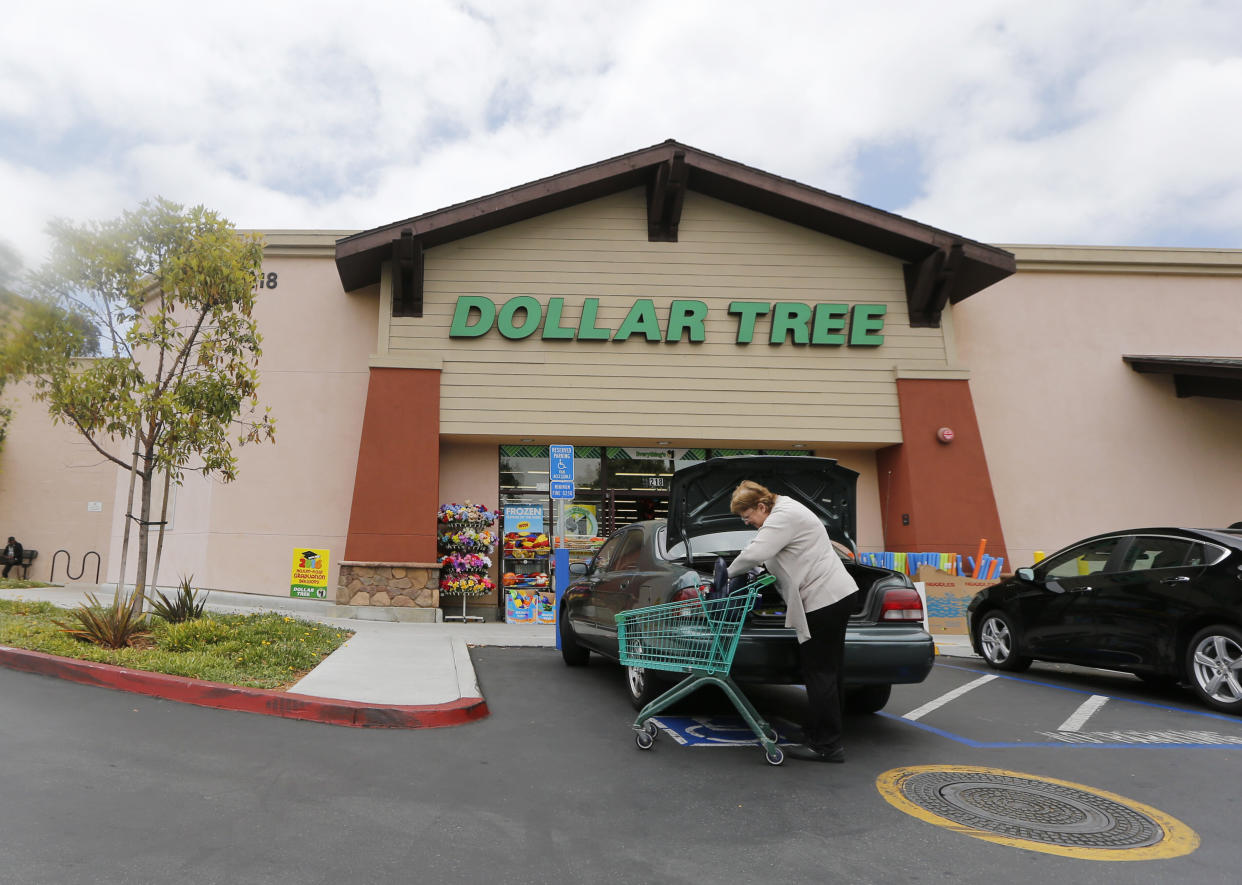Trump's trade war hasn't hurt the dollar stores (yet)
It’s bizarre seeing dollar stores Dollar Tree (DLTR) and Dollar General (DG) stocks still enjoying one hell of a year despite a wealthy president dubbed “tariff man” wreaking havoc on Corporate America’s confidence and bottom lines.
Dollar Tree and Dollar General shares are up an impressive 14% and 23%, respectively, this year compared to an 11% gain for the Dow Jones Industrial Average (^DJI). The Consumer Discretionary Select Sector SPDR Fund (^XLP) is up about 16% on the year. Keep in mind each dollar store’s business model is rooted in getting the cheapest wholesale inventory as possible mostly from overseas vendors, namely those housed in China. They then sell it at a $1 — or more — to a legion of low income shoppers.
Commonsense says that such a business model with next to no pricing power would be completely slammed during President Donald Trump’s trade war with China.
“There are clearly certain verticals in retail that are in the line of fire more than others. Furniture, consumer electronics and dollar stores that have limited or no pricing power based on the nature of the target audience and their business model. Dollar stores fall into that category. Hard to raise prices and or squeeze vendors to make up the 25% hit. Tough place to be,” said SW Retail Advisors President Stacey Widlitz.
Alas, that hasn’t happened... yet.
Dollar stores heavily rely on China
Both Dollar Tree and Dollar General have skin in the game in the trade war, so don’t let the bullish stock price movements fool you. The Dollar Tree banner alone relies on China for about 40% of its inventory, according to the company’s annual report. Meanwhile, its Family Dollar brand gets 18% of its inventory from China. Dollar General counts China as a direct source for roughly 6% of its products.
But even though Trump has imposed 25% tariffs on some $200 billion of Chinese goods, the country’s two main dollar stores (more than 30,000 stores combined) have largely circumvented big blows to their bottom lines six months into the year.
Each retailer has worked every possible angle to ensure costs remain at bay amidst heightened trade tensions and fresh tariffs with China. Some efforts by their respective executives include changing up product sizes, to squeezing vendors for lower prices, canceling orders to working with suppliers to re-engineer products.
Indeed the low-income shopper at the chains are probably getting the raw end of the stick from the clever maneuvering — think smaller product sizes that run out quicker or more inferior ingredients (that don’t work as well) in the actual product.

“Our efforts have focused on four key areas; continual negotiations with our vendors, product substitution, product re-engineering and country of origin and diversification.,” Dollar General CEO Todd Vasos said on the company’s first quarter earnings conference call. “We will do everything we can to minimize the impact of tariffs on our customers, but even with these efforts, we believe our shoppers will be facing higher prices as 2019 progresses. Our focus remains on maintaining our everyday low price leadership, which is a key pillar of our value proposition.”
Vasos’ peer at Dollar Tree, Gary Philbin, echoed that same playbook on his first quarter earnings call.
Dollar stores are vulnerable
Executives at the dollar stores shouldn’t get too comfortable, however. Should Trump slap his 25% tariffs on another $300 billion of Chinese goods (the dreaded “List 4” of many consumer focused products) — in effect all imports from the country — dollar stores could see their profits hammered in the second half of this year.
Remember, the dollar stores aren’t locked into long-term supply contracts such as manufacturers. That leaves the companies exposed to cost fluctuations, and potentially material ones as it pertains to higher tariffs.
“We buy products on an order-by-order basis and have no material long-term purchase contracts or other assurances of continued product supply or guaranteed product cost,” cautioned Dollar Tree in its latest annual report,
“We’re doing everything we can to minimize the impact on customers. But as you know, as others have said, this is — probably something that’s going to impact the customers, particularly if the list 4 comes out,” acknowledged Dollar General Chief Financial Officer John Garratt.
Shares will likely be ‘treading water’
The dollar store stocks have been trading as if Trump isn’t in a serious trade war with China. But that’s probably the wrong trade for investors to be making given the stalled discussions between the two countries.
Both of these stocks will need to be aggressively marked down in value should the trade war rage on and the additional tariffs go into effect. Think a complete re-rating as Wall Street meaningfully slashes their profit forecasts for 2019 and 2020.
“Despite what positives investors may glean from results/call and how well buyers have mitigated greater costs to this point, the potential for tariffs on List 4 items poses further risk to numbers given foreign sourcing exposure,” said Jefferies analyst Christopher Mandeville about Dollar Tree. “As a result, we see the stock treading water until greater clarity on the subject is rectified.”
The same thinking could be easily applied to Dollar General.
Brian Sozzi is an editor-at-large and co-host of ‘The First Trade’ at Yahoo Finance. Follow Brian Sozzi him on Twitter @BrianSozzi.
Read the latest financial and business news from Yahoo Finance
Why items at Dollar Tree will soon cost you way more than $1
Why the stock market is one or two bad economic reports away from a collapse
Follow Yahoo Finance on Twitter, Facebook, Instagram, Flipboard, SmartNews, LinkedIn, YouTube, and reddit.
